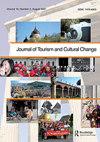后毛时代的澳门之旅:中国在澳门威尼斯人度假村的城市化赌博
IF 2.5
4区 管理学
Q2 HOSPITALITY, LEISURE, SPORT & TOURISM
引用次数: 3
摘要
澳门威尼斯人度假村是世界上最大的建筑之一,也是澳门最受欢迎的旅游景点,每年接待数百万来自中国大陆的游客。本文探讨了威尼斯酒店在中国国家新型城镇化规划中的作用,这是中国中央政府于2014年实施的一项宏观经济举措。该项目旨在使数以亿计的中国农村人口实现城市化,希望这些新的城市居民将创造一个足够强大的国内消费经济,以维持经济增长。提高城市消费水平的一个关键是培养路易斯·沃斯所说的“作为一种生活方式的城市主义”,即刺激市场活动的城市体验的密度、异质性和匿名性。本文借鉴中国本土的教育理论,以及中国在教学中运用规范模式来指导伦理行为,分析了威尼斯作为国家城市化规划中一个浓缩的模范城市。它探讨了威尼斯的游客如何体验一种规范的“城市主义作为一种生活方式”模式,这种模式适合后社会主义消费者,并为国家的经济发展做出贡献。威尼斯人作为一个私有化的城市圈地,从建筑上解决了中国宏观经济规划的内在矛盾,以及城市化给中央政府带来的风险。本文章由计算机程序翻译,如有差异,请以英文原文为准。
Macao’s post-Mao grand tour: China’s gamble on urbanization in the Venetian Macao Resort
ABSTRACT The Venetian Macao Resort is one of the world’s largest buildings and Macao’s most popular attraction, visited by millions of tourists each year from mainland China. This article explores the Venetian’s function in China’s National New-Type Urbanization Plan, a macro-economic initiative implemented in 2014 by China’s central government. The project aims to urbanize hundreds of millions of rural Chinese citizens in hopes that these new urbanites will create a domestic consumption economy powerful enough to sustain economic growth. One key to enhancing urban consumption levels is fostering what Louis Wirth called ‘urbanism as a way of life’ – the density, heterogeneity, and anonymity of urban experience that stimulates market activity. Drawing on indigenous Chinese theories of education, and China’s pedagogical use of normative models to guide ethical behavior, this article analyzes the Venetian as an encapsulated model city in this national urbanization plan. It explores how tourists in the Venetian experience a normative mode of ‘urbanism as a way of life’ that comports post-socialist consumers, and contributes to the country’s economic development. As a privatized urban enclosure, the Venetian constitutes an architectonic resolution to the inherent contradiction of China’s macro-economic planning, and the risks that urbanization poses to the central government.
求助全文
通过发布文献求助,成功后即可免费获取论文全文。
去求助
来源期刊

Journal of Tourism and Cultural Change
HOSPITALITY, LEISURE, SPORT & TOURISM-
CiteScore
5.10
自引率
9.10%
发文量
31
期刊介绍:
Journal of Tourism and Cultural Change ( JTCC ) is a peer-reviewed, transdisciplinary and transnational journal. It focuses on critically examining the relationships, tensions, representations, conflicts and possibilities that exist between tourism/travel and culture/cultures in an increasingly complex global context. JTCC provides a forum for debate against the backdrop of local, regional, national and transnational understandings of identity and difference. Economic restructuring, recognitions of the cultural dimension of biodiversity and sustainable development, contests regarding the positive and negative impact of patterns of tourist behaviour on cultural diversity, and transcultural strivings - all provide an important focus for JTCC . Global capitalism, in its myriad forms engages with multiple ''ways of being'', generating new relationships, re-evaluating existing, and challenging ways of knowing and being. Tourists and the tourism industry continue to find inventive ways to commodify, transform, present/re-present and consume material culture. JTCC seeks to widen and deepen understandings of such changing relationships and stimulate critical debate by: -Adopting a multidisciplinary approach -Encouraging deep and critical approaches to policy and practice -Embracing an inclusive definition of culture -Focusing on the concept, processes and meanings of change -Encouraging trans-national/transcultural perspectives
 求助内容:
求助内容: 应助结果提醒方式:
应助结果提醒方式:


